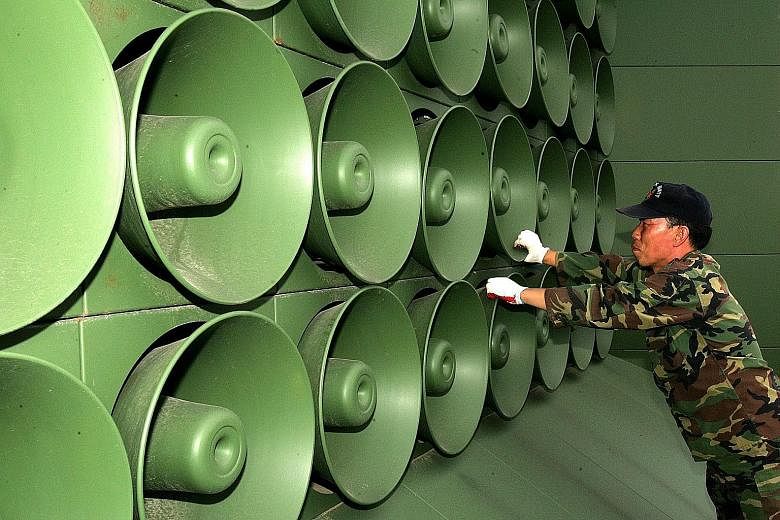SEOUL • In a high-tech world of sophisticated, subliminal messaging, screaming taunts over banks of loudspeakers seems like a decidedly old-school style of propaganda.
Retro or not, it has proved effective enough to prompt North Korea to threaten war if the South does not switch off the speakers it recently dusted off and retrieved from the military attic to harangue its rival across the border.
The use of loudspeakers to deliver high-decibel threats and taunts goes back to the 1950-53 Korean War, when mobile units with mounted megaphones would try to keep pace with the conflict's rapidly and wildly shifting frontline.
After the war cemented the division of the peninsula, North and South continued the loudspeaker battle, mixing it up with radio broadcasts and aerial leafleting.
The themes they favoured were initially quite similar - the iniquities of their respective socialist and capitalist systems, the mendacity of their respective leaders and the comforts to be found on their respective sides of the border.
In the 1980s-90s, when South Korea's economy really took off, its message changed as it increasingly trumpeted its success and affluence, while the North struggled with hunger and deprivation.
A former South Korean conscript who saw out his two-year military service with a border propaganda unit said the daily diet was largely tidbits of news and pop songs - old and new. In many ways, the main priority was just to make some noise. "We used to broadcast for 15 hours throughout the night into the following morning," he said.
And a military official recalled how commentary on some of the matches during the 2002 World Cup - co-hosted by South Korean and Japan - was broadcast live over the speakers to North Korean military units. "When we asked them through the loudspeakers whether they enjoyed it, we could see some signalling back their approval - waving their arms in circles," the official told online news provider Media Today.
A battery of loudspeakers could stand as high as 10m, with 70 to 80 units piled on top of each other.
"The impact was greater than you may expect," said Mr Ju Seung Young, a former North Korean soldier assigned to a unit on the western front before he defected to the South in 2002.
"The South Korean loudspeakers were a rare source for news about the outside world," Mr Ju told the Dong-A Ilbo newspaper.
"At first, I thought their broadcasts were all lies. But after being exposed for two years straight, I began to believe it."
AGENCE FRANCE-PRESSE

